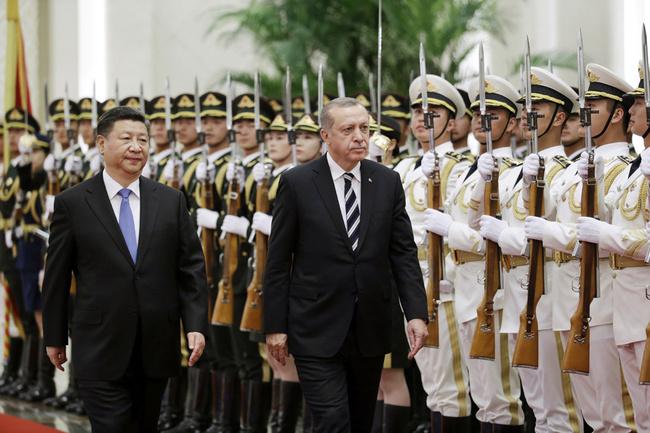Global Studies in Shanghai: Theory and Practice of Global Governance
archive


Global Studies in Shanghai: Theory and Practice of Global Governance
The world is full of uncertainty. Frequent regional conflicts, terrorism and refugees, as well as poverty, unemployment, and a widening income gap worldwide, have all increased the difficulty of national and global governance. At the same time, newly emerging economies are rising to challenge the traditional mode of world order. These developments increasingly draw the attention of the world to the negative consequences of globalization. Therefore, globalization and anti-globalization have become the two dominant trends of modern times.
Global governance that can manage imbalances between national and global governance, discrepancies between global governance and globalization, and unequal positions of nation states, demands reshaping the paradigm of globalization. To embrace this challenge, President Xi Jinping of China advanced the initiative for jointly building a “Silk Road Economic Belt and the 21st-Century Maritime Silk Road” (known as the “Belt and Road Initiative” or BRI) during his visit to central and southeast Asia in 2013. It aims to construct a global community with a shared future.
The Center for Global Studies (Center) at Shanghai University, echoing concerns of the country and the world in the context of BRI, provides new insights into national and global issues in the process of globalization. Against the backdrop of globalization and anti-globalization, the Center has been theorizing and practicing national and global governance. Its scholars see the “global” not as imaginary or abstract, but as existing in global-scale processes and activities that are manifested in real-world contexts. The relationship between national and global governance is interactive and holistic because governance arrangements at different levels are linked, and display crucial similarities. As expressed by Darian-Smith and McCarty, a global studies approach offers unique insights into real world problems that have practical and policy implications (2016: 39).
Ideas beyond borders
The Center encourages the free exchange of ideas beyond borders. Global studies scholars shift their focus to look beyond the national to the entire local-global continuum (Pieterse 2013), as local issues are embedded in global contexts while global processes that are tangible and accessible can be manifested in locales and the lives of ordinary people. It is therefore feasible and beneficial to do global studies by seeing the global through the local and vice versa. Additionally, globalization processes and global problems have produced new challenges and demand new methods. Global studies will integrate globally-based data and synthesize the various disciplinary studies of globalization to create—“potentially”—a new “approach” to global issues (Archer 2013:522).
Practically, the resolution of global issues and the good performance of national and global governance demands talented personnel with global vision and interdisciplinary knowledge. The Center has more than thirty researchers from various disciplines such as history, economics, sociology, geography, literature, linguistics, anthropology, law, politics, and international relations, including several full-time international scholars. With strong problem-based awareness, researchers in the Center have carried out collaborative work to probe into a range of global issues such as race, global capital, water disputes, land policy, climate change, immigration, sovereignty, territoriality, global citizenship, nationalism, illicit drugs, public health, religious terrorism, and bilateral and multilateral relations. These projects address focused research questions by engaging a global perspective. They develop a transdisciplinary mode of inquiry that shatters disciplinary borders and expands academic cooperation.
The relationship between national and global governance is interactive and holistic because governance arrangements at different levels are linked, and display crucial similarities.
For research to be global does not mean that its object of study must necessarily be large in a spatial sense or that it intrinsically has a worldwide reach (Darian-Smith and McCarty 2016: 23). Currently, the research and teaching of the Center focuses on three thematic areas: theories of globalization and global studies, globalization and regional social development, and research on global issues. Many courses reflect the concerns of global studies, such as “China and the Middle East,” “Global and Regional Development,” “Islamic Movements,” “Global Challenges: Environmental and Economic Development since 1950,” and “The Rise of Asia and New World Order.” Student-focused research and activity can help junior practitioners to integrate the national, local, and global visions in their studies of the global. In this sense, the local and global are mutually constitutive, creating and recreating each other across conceptual fields in a constant dynamism (Darian-Smith and McCarty 2016: 17).
To approach these themes, scholars at the Center appreciate empirical research and case studies in order to deal with the regional and national issues more effectively. Therefore, the Center has established three sub-centers that each focuses on a region; these are the Center for Turkish Studies covering Turkic-speaking countries in the Middle East and Central Asia, the Center for South Asian Studies, and the Center for Latin American Studies. Each center focuses on key countries, such as Turkey, Argentina, Pakistan, and India, in order to provide case studies for the investigation of such non-traditional security issues as religion, culture, transnational immigration, drug abuse, epidemic diseases, environmental pollution, and ecology.

Xi Jinping and Turkish President Recep Tayyip Erdogan. Belt and Road Forum in Beijing, May 2017. Photo: AP/Jason Lee
This innovative blending of global studies theories and perspectives with the empirical data and case studies of countries has enabled the Center to extend its influence beyond the Academy to reach policy-makers, think tanks, youth, media, and NGOs, benefitting many constituencies. It has received recognition and support from the government and public, as for example, the designation of the Center for Turkish Studies as an International and Regional Studies Affiliate of the Ministry of Education. Additionally, the Center serves as a consultant on important local and national issues.
Bidirectional flows of talent
To further intercultural understanding and nourish intellectual needs regarding perceptions of global issues and governance, the Center facilitates bidirectional flows of global talent. An example of an inward flow is the interdisciplinary China Studies program, an English-taught program for international students. As of October 2017, there were eighty-two MA and PhD students and post-doctorate researchers from twenty-two countries pursuing degrees in history, sociology, economics, and international relations. Outward flows are seen in the extensive exchange and cooperation with the media and policy-makers of different regions that the Center has established to strengthen consensus on global issues. Recent examples of such activities are the dialogue between the Center and Turkish media Daily SABAH in March 2017, and the establishment of the China-Argentina International Center for Joint Research in April 2017.
For research to be global does not mean that its object of study must necessarily be large in a spatial sense or that it intrinsically has a worldwide reach.
The Center has sought to accommodate the burgeoning interest of international scholars in the BRI by establishing faculty research, teaching, and conferences that are aligned with it. Examples are the Edward Said Lecture Series, the South Asia Lecture Series, and Latin America Lecture Series, which bring diplomats, professors, and journalists from Turkey, Chile, Pakistan, and India to share their BRI research in classes at the Center. Such forums and conferences as “Situations of Middle East and the Belt and Road,” and “Studies on the Belt and Road from Multidisciplinary Perspectives” involve students from different countries. These create a venue for students to articulate concerns about the impact of the BRI in their home countries, thereby stimulating discussion and commentary from participants from other countries. These forms of brainstorming and intellectual negotiation have sparked new ideas for identifying and managing differences that result from the implementation of the BRI, which serves to strengthen interconnectedness within the Academy and stimulate further examination of national and global issues.
Problems of global governance push us to re-examine the mechanisms of global governance, as well as to reflect on the question of who is undertaking the task of global governance. To a large extent, global governance depends on what ways and by what principles global issues are managed. How to make global institutions and mechanisms effective and accountable poses a great challenge to researchers. In this regard the BRI has been applauded around the world. It gives responses to the questions of how to place the interests of people and the common good at the heart of global governance. Professor Guo Changgang, director of the Center, emphasizes that the BRI, as a new way of rethinking globalization, will bring about new modes for regional and global peace and development, and even potentially shape the new global system.
Darian-Smith, E. and Philip C. McCarty. 2016. The Global Turn: Theories, Research Designs and Methods for Global Studies.
Pieterse, Jan Nederveen. 2013. “What Is Global Studies?” Special issue, Globalizations (Vol. 10, No. 4) 499–514.
Archer, K. 2013. "Searching for the Global in Global Studies." Globalizations (Vol. 10, No. 4) 521–525.



